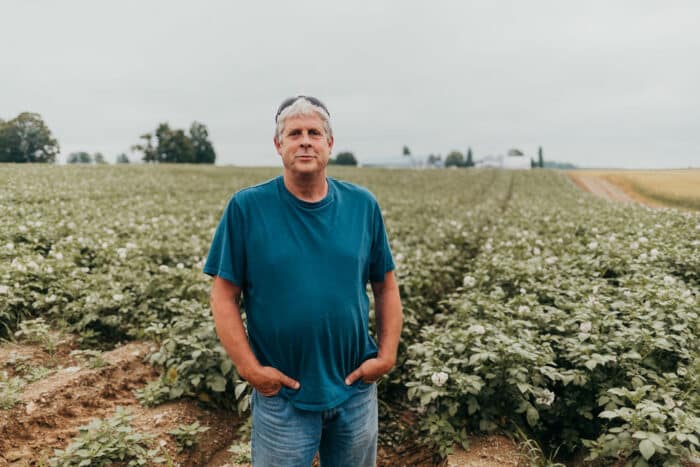Once potatoes are harvested and go into storage, the conditions can be unknown but Cellar Insights is trying to change that.
After all the time that’s put into planting, growing and harvesting hundreds of acres of potatoes, that crop then goes into storage where facility conditions can put it at risk of rot and shrink. Ross Culberson, Cellar Insights co-founder and a potato grower in Carleton County, N.B. saw a knowledge gap in this production cycle, so he created the Cellar Insights platform to reduce the number of unknowns when it comes to potato storage.
“I’m taking 100 acres of production and putting it under one roof,” says Culberson. “I want to do everything I can to protect it. I used to be (held) hostage (all day) to managing that risk (as a potato grower). Now I’m only doing it in just a few minutes each day.”
Cellar Insights uses technology to remotely monitor potato storage conditions. By using sensors in the storage facilities, growers can watch for any conditions of concern — this monitoring is done through a phone app.

“Without monitoring technology, I would be visiting at least twice a day to check the temperature and carbon dioxide levels,” shares Culberson. “To watch for potential spoilage issues within the storage, you go in and basically sniff the building with your nose, using your past experience to assess the risk within the building.”
Having accurate data on facility conditions was a blind spot in the potato production process and Culberson wanted a more data driven approach — he created Cellar Insights to solve this issue. However, it hasn’t always been smooth sailing for the Cellar Insights team during the development process.
“Potato storage is one of the harshest environments on the planet. We have wind speeds from our fans that we try to maintain and 98 per cent humidity for 10 months of the storage season. Putting technology in an environment like that is not very cooperative,” explains Culberson.
Once the Cellar Insights team was able to identify technology that could work and withstand that type of harsh environment, it was left with its next biggest hurdle of what parameters should be monitored?
“This year we are starting off with the basics of temperature, humidity, and carbon dioxide,” says Culberson, explaining what can be monitored through the 2023/24 storage season pilot program. “We’re doing ongoing research on what will be the next parameter. Spoilage risk assessment is our focus.”
Currently, not all growers have remote monitoring in their potato storage facilities such as a modern ventilation system with remote access control. There are many facilities that don’t have internet capabilities as part of their functions either. Cellar Insights’ basic pilot program brings their facilities up to speed with access to modern remote monitoring. Culberson feels there’s a lot of potential for wireless sensing in potato storages but narrowing down what to use those sensors to monitor takes time.
“We’re always in conversation with growers,” says Culberson. “You have to be willing to stand up in front of them and say, ‘Hey, maybe there’s something here. Let’s try this.’ Then, with pilot participants, observe closely how they use the data, what they value, how they see it will help protect their crop value.”
For the 2023/24 storage season pilot program Cellar Insights is working with 25 growers to improve the monitoring technology by growing the parameters it’s using. Cellar Insights plans to be commercially available in Canada for the 2024 storage season and 2025 in the United States.
Header photo — An example of a storage facility that’s using Cellar Insights. Photo: Cellar Insights
Related Articles
The Importance of Sanitizing Your Spud Storage (and Equipment)
Potato Storage Remote Monitoring, Intelligence Platform Launched









